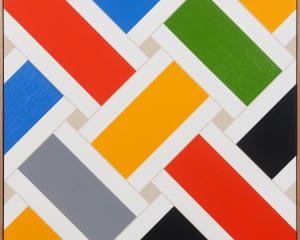He's l'enfant terrible of New Zealand art. Nigel Benson pulls the devil's mask off Ben Webb.
"I'm the most notorious artist in New Zealand - there's no doubt about it," Ben Webb muses, while cradling a cup of herbal tea.
"There's definitely some institutional hostility towards me in New Zealand."
An art critic once described Webb to me as "the princeling of New Zealand art royalty".
But the 32-year-old Dunedin artist has his detractors, too, and there's no doubt he has rattled both sabres and cages during his career.
"I have you at the throat by your beauty" will be the first major Dunedin exhibition of Webb's brooding works in more than a decade.
"It [the exhibition] will have a non-New Zealand basis. It's all been sourced from a large visual archive I worked on in Germany and eastern Europe," he says.
"I sifted through thousands of flea markets and photo archives. All the images are from things I've found. There might be one in a thousand images I can use.
"My work always references recurring themes like forensic imagery, theatre, history, pornography and found photographs."
Webb is an industrial artist with a surgeon's eye.
His pathos-drenched black-and-white images reach back behind the Iron Curtain into a world of propaganda and pornography.
"My imagery is elusive because it dramatises the innocuous. But I have no inspiration, really. It's all just about aesthetics, which I appropriate from a variety of different archives," Webb says.
"My approach to image-making has never changed. I've always focused on found media.
Very much like other autodidactic artists, like Jeffrey Harris and [late Christchurch artist] Tony Fomison.
"But there's no autobiographical referencing in any of my art. I approach it on a base intrinsic level. It's about simple aesthetics. I don't have anything to say. Nothing at all. And I don't assume anyone relates to anything I do."
I ask Webb what he would have done, if not for art.
"I honestly have no idea," he says, as though it's the first time the thought has struck him.
"I first started as an artist out of extreme boredom, really, and it's just progressed.
"I came from a heavy arts background. I was surrounded by working artists from a very young age and never had any romantic idea about what life as an artist was. I've no illusions about the art world."
Webb grew up amid a coterie of artists, actors and poets, such as Ralph Hotere [who is his godfather], Jeffrey Harris, Colin McCahon, Andrew Drummond, Patric Carey, Patricia and Kobi Bosshard, Rodney Kennedy and Webb's mother, printmaker and art teacher Marilynn Webb.
"My childhood in Dunedin in the '80s was an artistically stimulating environment because of the number of artists around.
"The Bosshard Gallery [now Brett McDowell Gallery] was burgeoning and the Dunedin Sound music scene was happening. It all had an influence on me," he says.
"I think one of the strongest influences in my work is Jeffrey Harris. Through him, I learned about negative space and black areas. Ralph [Hotere] gave me a wider understanding about black and darkness."
"Looking back, I was incredibly privileged to be immersed in the arts from such a young age the way I was.
I was always surrounded by artists and artworks and both my mother and father [former Dunedin barrister Maurice Knuckey] had large art collections."
Webb was home-schooled from 12. At 14, he had his first studio, in Lower Stuart St, which he still uses today.
In March 1992, when he was just 17, Webb was nominated by Metro magazine as New Zealand's most promising up-and-coming artist.
But his career really leapt into life in 1996, when he was 19, following his "Open Hang" exhibition at the Dunedin Public Art Gallery.
The same year he was the youngest of the New Zealand artists chosen to exhibit in the Asia-Pacific Triennial of Contemporary Art in Brisbane.
As a figurative painter reworking appropriated imagery, Webb has often been compared to the Neue Sachlichkeit, or "New Objectivity", artists in 1920s Germany, such as Otto Dix and George Grosz.
It is, perhaps, unsurprising then that Berlin is Webb's second home. He divides his time between Dunedin, Aramoana and Berlin.
He first moved to Germany in 1998, winning a Goethe Institute Fellowship in 2001 and exhibiting in Kunstraum Kreuzberg/Bethanien last year.
"I was living there at the end of Berlin's heyday, when everything was unregulated. There were illegal bars everywhere. It was mad, totally mad, but it was also a lot of fun."
Gow-Langsford Gallery director John Gow, who represents Webb in Auckland, says the artist's perceived abrasiveness is a result of him being "an independent thinker".
"There's a confidence and an air of expectancy which might upset some people, but I really like that about Ben. He has a kind of self-belief which is very self-assured," Gow says.
"He knows what's happening around the world, he knows what he's doing, he knows the quality of his work and is willing to back himself to a large degree."
Art writer and curator Peter Entwisle has known Webb since he was a child.
"I do think he's the last - or at least the latest but probably the last - of a certain line of New Zealand/Dunedin art historical descent which goes back to McCahon and beyond," Entwisle says.
"He's both proud of his art historical lineage but very anxious to be judged autonomously, which is entirely human and completely understandable.
"He is technically sophisticated. He is deeply informed about art history.He is visually intelligent. His work addresses universal human issues through strong emotion. It is risky, challenging, beautiful, cathartic.
"Ben puts me in mind of Jim Baxter, who burst upon the New Zealand literary scene at 17 already a highly sophisticated poet and went on from there."

















